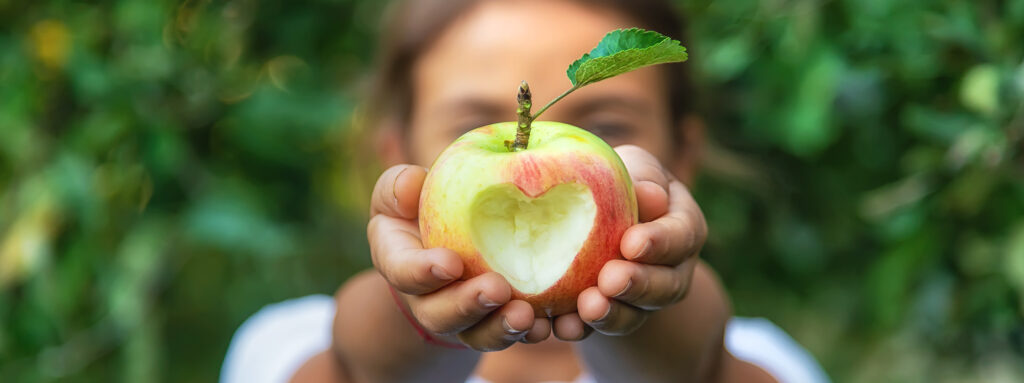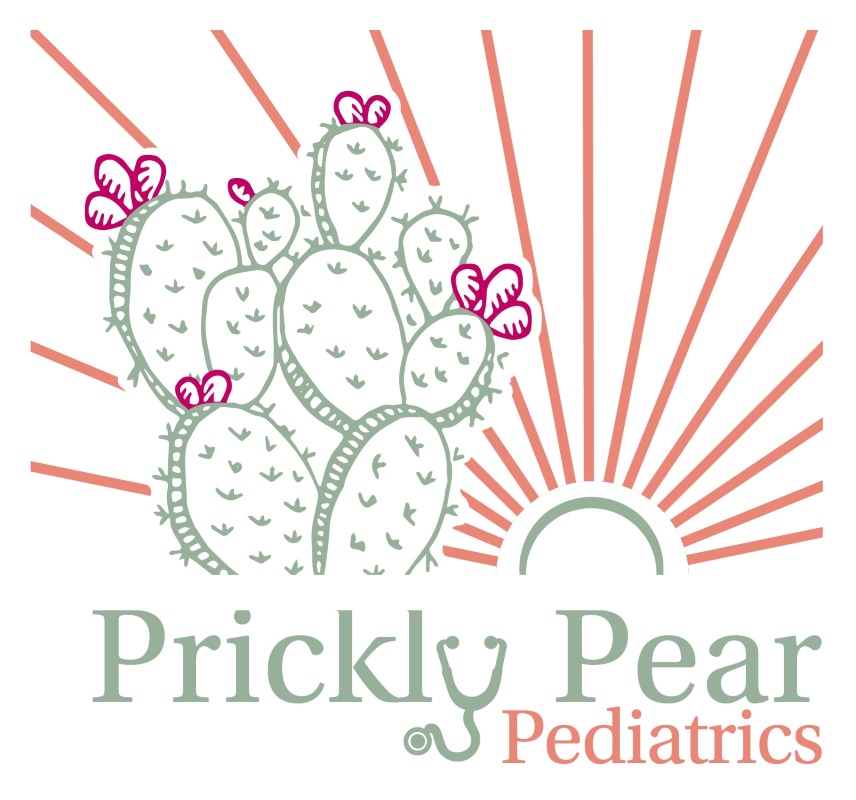Gut Health: Improving Your Child’s (And Your) Microbiome

What is “Gut Health?
A lot of people may hear the word “bacteria,” and instantly think of an organism that is bad, dangerous, and to be avoided. However, did you know that humans have 10-100 trillion microbial (bacteria, fungus, and viral) cells that live on and inside of us that are an integral part of our overall health? This is called our own personal microbiome. We have more bacterial genes than human genes inside of us, which means that these organisms must play a big part in our lives. For this post, when I talk about “gut health,” I am referring to the balance of healthy bacteria, fungi, and viruses (your microbiome) that live inside your GI tract.
Why is Gut Health Important?
There is more and more research showing that the makeup of the type and number of bacteria that live in and on us can affect our immune system, digestive health, appetite, sleep quality, energy levels, mental health, and much more.
Since I have learned about how important the balance of our microbiome is to our overall health, I feel like I need to shout it from the rooftops! The microbiome may play a role in the development of food allergies, asthma, eczema, obesity, autoimmune conditions, depression, anxiety and many other diseases. Improving the health of our microbiome is not the only answer or factor in these complex issues. But, it may help more than we realize, so why not try to improve this one aspect that we can control?
Gut Health Starts at the Very Beginning
The health of a pregnant woman’s microbiome shapes the beginnings of her child’s microbiome. The way that a baby is born affects their microbial makeup. Studies have shown that a baby born by vaginal delivery is colonized by the vaginal, fecal, and skin flora of their mom. In contrast, babies born by c-section are colonized by a larger proportion of skin flora since they do not pass through the vaginal canal. The vaginal flora has a higher amount of a bacteria called lactobacillus, which helps protect against infective bacteria ascending to the uterus during pregnancy.
Lactobacillus colonizes the baby’s gut following birth and seems to have a protective effect on the intestinal mucosal layer. Breastmilk contains components which help to promote a healthy balance in the gut microbiome as well. Specifically, breastmilk contains a prebiotic called oligosaccharide, which the “good bacteria” feed. Breastmilk also contains a probiotic called Bifidobacterium. Bifidobacterium helps to create a healthy intestinal lining and also seems to have a role in the initial teaching of the baby’s immune system.
What You Can Do to Improve Gut Health?
If your child wasn’t born vaginally, or you weren’t able to breastfeed, that is ok! Those are 2 ways to promote a healthy microbiome, but there are other things that you can do to help to optimize and maintain a healthy microbiome for you and your child:
-
Eat plants.
I know people hear this advice over and over, but it really is true. Plants have a lot of health benefits. For gut health especially, eating plants provides the “good” bacteria that live inside our digestive track with certain types of fiber and sugars (also known as prebiotics) that they need to survive. Eating a variety of fruits, vegetables, nuts, seeds, and grains consistently feeds the microbiome with prebiotics. Prebiotics allow the good bacteria to thrive and help keep the “bad bacteria” to a minimum.
A great goal is to try to eat at least 5 different plants per day. This may sound daunting, but if you make it a priority and keep it simple, this is totally doable. For example: include some apple slices and a handful of almonds with breakfast, carrot sticks and blueberries with lunch, and sauteed squash with your dinner, and there you have hit 5 plants for the day! I know that toddlers and children can be picky with fruits and vegetables. However, early exposure to these foods, a parent or caregiver modeling eating these foods consistently, allowing them to help pick out the fruits and veggies, and repeated exposure to a variety of fruits and vegetables helps in most cases. Stay consistent and persistent!
-
Eat fermented foods.
Fermented foods contain probiotics that can help promote healthy gut bacteria. Examples or fermented foods are: Sauerkraut, tempeh, kefir, yogurt, kombucha, kimchi, miso, and some pickled vegetables. The key with these foods is that if you are purchasing them from the store, the label either needs to say “contains live cultures” or “naturally fermented.” Try to choose products that do not contain a lot of added sugar. You can even make some of these things at home! (See resources below). It’s ok if you can’t eat a fermented food every day, but a few times per week is a great goal.
-
Avoid ultra-processed foods.
There are a lot of reasons to avoid ultra-processed foods, and maintaining a healthy microbiome is one of them. Ultra-processed foods are typically devoid of the nutrients that the original food in its natural state contained. Instead, they have added fats, oils, sugars, and chemicals. For example, eating a whole potato (with skin on) provides you with Vitamin C, potassium, fiber, Vitamin B6, Magnesium, Phosphous, Niacin, and Folate. Eating a serving of standard potato chips (an ultra-processed food) provides you added hydrogenated oil, sodium, added sugar, preservatives, and a tiny fraction of the Vitamin C and potassium that was found in the potato.
Ultra-processed foods are often mass produced in factories, packaged in bags/boxes and are convenient. Examples of ultra-processed foods: store bought chips, crackers, candy, cookies, cereals, white bread, granola bars, and sodas. There are way too many of them to list. This is because they have become incredibly lucrative for the food industry, popular with consumers, and widely available. Eating a diet high in ultra-processed foods can decrease the diversity of the intestinal microbiome and may increase inflammation by causing destruction of intestinal mucosa and killing some of the “good” bacteria.
-
Avoid unnecessary antibiotics.
There are times when antibiotics are absolutely necessary and important. If a doctor has diagnosed a bacterial infection and recommended treatment with antibiotics, then it is important to follow your doctor’s recommendations. However, over the course of my career, I have unfortunately seen countless patients with a similar story: a child had cough and congestion for 3 days, was taken to urgent care, was diagnosed with a viral respiratory illness (like the common cold), and was prescribed antibiotics.
I have also seen parents use leftover antibiotics to treat their child with ear pain for presumed infection prior to getting the child examined. Not every infection is bacterial. In fact, the overwhelming majority of illnesses in young children are caused by viruses, which antibiotics will not help with at all. If you or your child are prescribed antibiotics, it should be clear to you what the bacterial infection is that is being treated.
-
Probiotics.
I do not believe that everyone needs to be on probiotics. If you are doing the other things listed here to help keep your (and your child’s) microbiome healthy, then you likely don’t need to take probiotics. However, if you or your child have recently been on antibiotics for treatment of a bacterial infection, those antibiotics have likely killed some of the healthy bacteria inside of your intestines. Sometimes a rough course with a stomach virus can also knock out some of the good bacteria by causing some damage to the intestinal lining. For those reasons, you may benefit from a course of probiotics. I would recommend discussing this with your doctor to determine what type and what duration is appropriate for your or your child’s situation.
-
Get outside.
There have been studies done that show that increased exposure to nature positively impacts the gut microbiome. Touching the soil and plants seems to improve microbiome composition. For many people, being outside in nature also helps to lower their stress level, which is of course important for better overall health. There is even a study that suggests that toddlers who had dedicated time to play outside had overall improved mood with less anger and aggression (always a good thing with toddlers!).
-
Exercise.
Studies have also shown that exercise helps to improve the health and diversity of the bacteria species in the microbiome. Especially moderate, voluntary, and enjoyable exercise seems to have the most benefit (playing tag in the park with friends) vs forced and less enjoyable exercise (running on the treadmill alone). Intense exercise and dietary restriction (eating too few calories) actually showed to have a negative effect on the microbiome by decreasing bacterial diversity and causing some intestinal mucosal wall damage.
A Healthy Balance
I believe it is important to remind people, especially parents, that you don’t have to be perfect. Absolutely no one is perfect, so release yourself from the pressure! You don’t have to do 100% of these things 100% of the time to have a healthy microbiome. But if long term health for yourself and your children is a priority, then work towards incorporating the above into your daily life. Treat your microbiome well so that it can treat you well!
~~Dr. Webb
Sources and Resources
Effects of pregnancy, childbirth, and feeding on infant microbiome
https://www.ncbi.nlm.nih.gov/pmc/articles/PMC4464665/
Article about ultra-processed foods and effect on bacterial species in microbiome
Study about effect of playing in nature on toddlers’ behavior and microbiome
Study about impact of exercise on microbiome
https://www.ncbi.nlm.nih.gov/pmc/articles/PMC5357536/
Description of fermented foods and recipe for making your own pickled vegetables which contain probiotics
https://www.health.harvard.edu/blog/fermented-foods-for-better-gut-health-20180516138


One Response